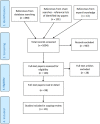Developing a digital intervention for cancer survivors: an evidence-, theory- and person-based approach
- PMID: 31508496
- PMCID: PMC6718425
- DOI: 10.1038/s41746-019-0163-4
Developing a digital intervention for cancer survivors: an evidence-, theory- and person-based approach
Abstract
This paper illustrates a rigorous approach to developing digital interventions using an evidence-, theory- and person-based approach. Intervention planning included a rapid scoping review that identified cancer survivors' needs, including barriers and facilitators to intervention success. Review evidence (N = 49 papers) informed the intervention's Guiding Principles, theory-based behavioural analysis and logic model. The intervention was optimised based on feedback on a prototype intervention through interviews (N = 96) with cancer survivors and focus groups with NHS staff and cancer charity workers (N = 31). Interviews with cancer survivors highlighted barriers to engagement, such as concerns about physical activity worsening fatigue. Focus groups highlighted concerns about support appointment length and how to support distressed participants. Feedback informed intervention modifications, to maximise acceptability, feasibility and likelihood of behaviour change. Our systematic method for understanding user views enabled us to anticipate and address important barriers to engagement. This methodology may be useful to others developing digital interventions.
Keywords: Human behaviour; Quality of life.
Conflict of interest statement
Competing interestsThe authors declare no competing interests.
Figures



Similar articles
-
Development of a Digital Lifestyle Modification Intervention for Use after Transient Ischaemic Attack or Minor Stroke: A Person-Based Approach.Int J Environ Res Public Health. 2021 May 2;18(9):4861. doi: 10.3390/ijerph18094861. Int J Environ Res Public Health. 2021. PMID: 34063298 Free PMC article.
-
Eczema Care Online: development and qualitative optimisation of an online behavioural intervention to support self-management in young people with eczema.BMJ Open. 2022 Apr 20;12(4):e056867. doi: 10.1136/bmjopen-2021-056867. BMJ Open. 2022. PMID: 35443955 Free PMC article.
-
Using the Person-Based Approach to Develop a Digital Intervention Targeting Diet and Physical Activity in Pregnancy: Development Study.JMIR Form Res. 2023 May 26;7:e44082. doi: 10.2196/44082. JMIR Form Res. 2023. PMID: 37234026 Free PMC article.
-
Digital interventions for hypertension and asthma to support patient self-management in primary care: the DIPSS research programme including two RCTs [Internet].Southampton (UK): National Institute for Health and Care Research; 2022 Dec. Southampton (UK): National Institute for Health and Care Research; 2022 Dec. PMID: 36538606 Free Books & Documents. Review.
-
Planning a digital intervention for adolescents with asthma (BREATHE4T): A theory-, evidence- and Person-Based Approach to identify key behavioural issues.Pediatr Pulmonol. 2022 Nov;57(11):2589-2602. doi: 10.1002/ppul.26099. Epub 2022 Sep 6. Pediatr Pulmonol. 2022. PMID: 35932183 Free PMC article. Review.
Cited by
-
Using qualitative and co-design methods to inform the development of an intervention to support and improve physical activity in childhood cancer survivors: a study protocol for BEing Active after ChildhOod caNcer (BEACON).BMJ Open. 2020 Dec 21;10(12):e041073. doi: 10.1136/bmjopen-2020-041073. BMJ Open. 2020. PMID: 33371034 Free PMC article.
-
Planning and developing a web-based intervention for active surveillance in prostate cancer: an integrated self-care programme for managing psychological distress.Pilot Feasibility Stud. 2022 Aug 9;8(1):175. doi: 10.1186/s40814-022-01124-x. Pilot Feasibility Stud. 2022. PMID: 35945609 Free PMC article.
-
Digital humanistic program to manage premature frailty in young breast cancer survivors with gender perspective.NPJ Digit Med. 2025 Jan 16;8(1):35. doi: 10.1038/s41746-025-01439-y. NPJ Digit Med. 2025. PMID: 39820349 Free PMC article.
-
Implementing a Digital Physical Activity Intervention for Older Adults: Qualitative Study.JMIR Aging. 2025 Aug 21;8:e64953. doi: 10.2196/64953. JMIR Aging. 2025. PMID: 40840434 Free PMC article.
-
Online Interventions to Improve Mental Health of Pediatric, Adolescent, and Young Adult Cancer Survivors: A Systematic Review and Meta-Analysis.Front Psychiatry. 2021 Dec 23;12:784615. doi: 10.3389/fpsyt.2021.784615. eCollection 2021. Front Psychiatry. 2021. PMID: 35002804 Free PMC article.
References
-
- Department of Health – Quality Health. Quality of Life of Cancer Survivors in England: Report on a Pilot Survey Using Patient Reported Outcome Measures (PROMS) (DOH, London, 2012).
Grants and funding
LinkOut - more resources
Full Text Sources
Molecular Biology Databases

